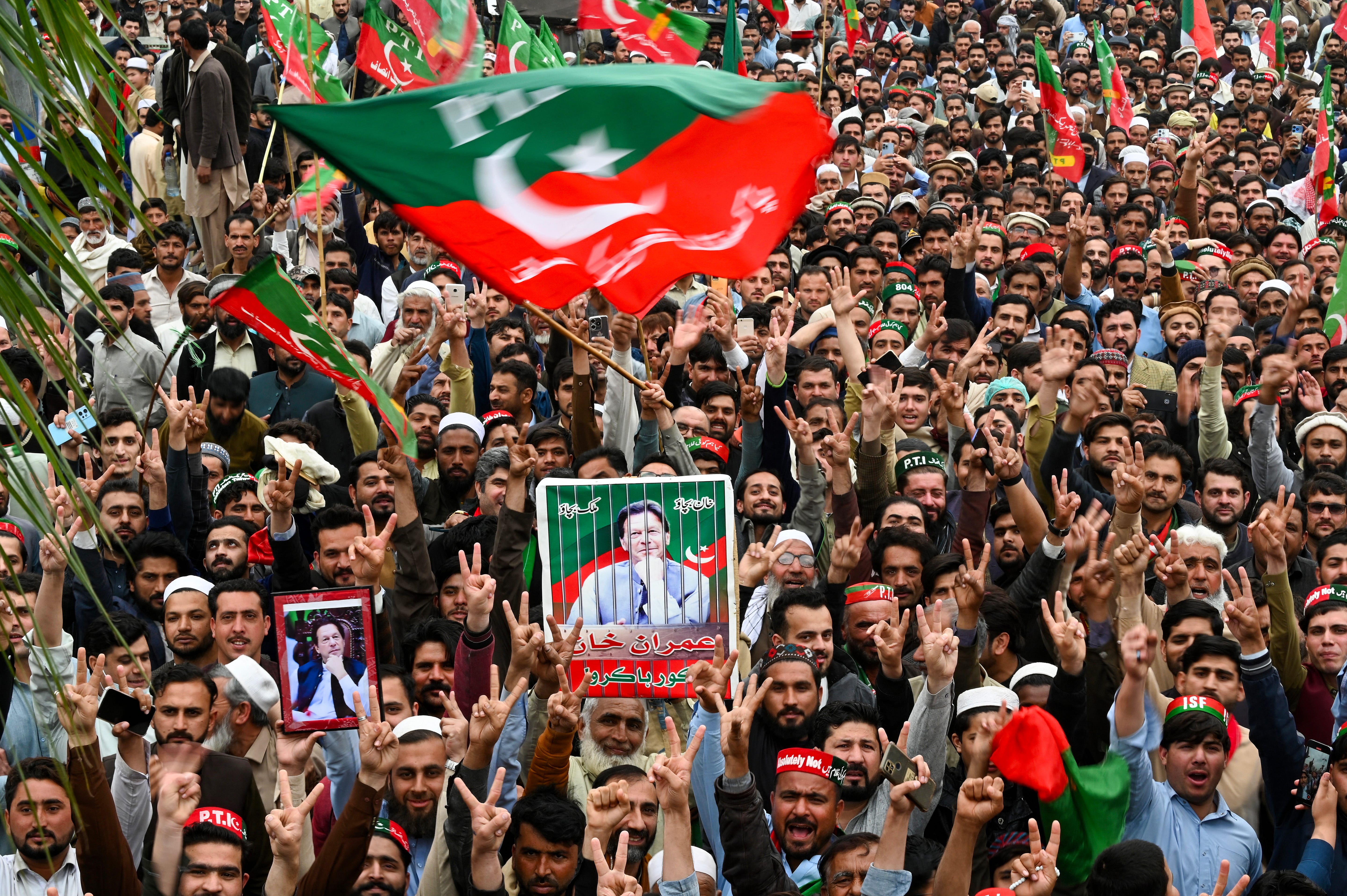Pakistan’s Military Hopes to Drag Trump Back into War in Afghanistan
The failed backroom talks between the military and PTI have set the stage for the junta to reassert control and escalate into Afghanistan
Pakistan’s military establishment is considering launching a large-scale military campaign against Islamic State-linked groups in neighboring Afghanistan—a dramatic move they hope would draw the U.S. back into the region as an ally and counterterrorism partner, according to sources who spoke to Drop Site News.
The remarkable plan to escalate regional conflict is going hand in hand with an effort by Asim Munir, Pakistan’s chief of army staff general, to settle his conflict with the military’s major political opposition, the Pakistan Tehreek-e-Insaf (PTI) party, in order to shore up the domestic front and focus abroad. In recent meetings, the military has pushed PTI to accept a deal that would sideline its combative leader, the imprisoned former prime minister Imran Khan, in exchange for a political détente.
A deal that would normalize the PTI’s ties with the military in exchange for jettisoning Khan continues to be the subject of negotiations between the two sides. The paralyzing political crisis began with Khan’s removal from power by the military in 2022, amid private pressure from State Department diplomats.

The PTI has endured intense pressure as a result of its long-running standoff with the military, punctuated by last year’s flagrantly rigged election. Since then, the party has been barred from power and its members have faced imprisonment, torture, and killings at the hands of the current military-backed government.
The military now wants a deal to bring the standoff to a close, consolidating domestic support in advance of its planned escalation in Afghanistan, which sources who spoke to Drop Site said would likely include both major ground operations and airstrikes. For the PTI, the prospect of making a deal would help relieve pressure on the party and allow it to normalize its status in the country, but at the cost of acquiescing to the military’s domination of Pakistani politics and likely sacrificing Khan. Khan remains the primary draw for the party, which raises the question of what the PTI even is without him.
On January 16 in Peshawar, a major city near the Afghan border in the PTI stronghold of Khyber Pakhtunkhwa (KP), Munir and members of the military brass met with key party figures and a group of businessmen, local leaders, and influential figures from the civil and security establishment.
The meeting prompted rumors among observers that the PTI and the military were on the verge of a deal to halt the conflict between the two sides and potentially resolve Khan’s fate. According to statements from Gohar Ali Khan, caretaker chairman of the PTI, Khan had endorsed the Peshawar dialogue from prison and said that the PTI welcomed direct talks with the military establishment. “There is no need for backdoor talks when everything is happening out in the open,” Gohar declared.
In fact, not all was happening out in the open. In a series of closed-door discussions on the sidelines of the meeting, senior army officials demanded a series of major concessions from the PTI aimed at subordinating it to military authority and effectively severing its connection with Khan, according to sources informed about the discussions.
The sources also said that the military appeared to exploit divisions among PTI leaders Gohar and Ali Amin Gandapur, chief minister of KP, in an effort to drive a wedge in the party. Within Pakistan, Gandapur is viewed as loyal to the military and intelligence establishment.
In its official statement about the Peshawar meeting, the military appeared far less enthusiastic than the PTI about the substance of their talks. “The conversation with Barrister Gohar and Ali Amin Gandapur in Peshawar took place in the context of security and counterterrorism issues in KP,” the statement read. “Barrister Gohar tried to discuss political issues. Barrister Gohar was told to discuss political issues with politicians.”
Although no official statement was made regarding Khan’s fate, following the meeting it became clear that the military had maintained its uncompromising stance towards the former prime minister. At around noon on the day after the meeting, the National Accountability Bureau handed down a full sentence of incarceration to Khan and his wife, Bushra Bibi, who has also been caught up in a series of legal cases: 14 years for Khan and seven years for Bibi.
A Delicate Balance
The efforts by the military to break the PTI come as it attempts to rebuild its security partnership with Washington, D.C. Since deposing Khan in a no-confidence vote in 2022, the military has engaged in limited security cooperation with the U.S., including joint counterterrorism exercises and arms support for the war in Ukraine.
But sources who spoke to Drop Site said that Islamabad sees its possible Afghanistan campaign—premised on the idea of fighting Islamic State-linked groups who they blame for numerous terrorist attacks in Pakistan and who have also carried out operations abroad—as a way to persuade the U.S. into once again becoming a close security partner. Despite the military’s hopes, ramping up tensions with its neighbor may fail to win over President Donald Trump, who has made extricating the U.S. from the broader region a priority.
As a prerequisite to any offensive inside Afghanistan, Munir believes the army must first settle its domestic political conflict with the PTI. Without buy-in from Pakistan’s political parties, the military risks fighting on two fronts: a messy conflict abroad, and a legitimacy crisis at home.
The region is home to a number of competing militant groups, including the Pakistani Taliban (TTP) and the local branch of the Islamic State, known as ISIS Khorasan Province (ISIS-K). Following the collapse of the U.S-backed government in Afghanistan, the Afghan Taliban, formerly an insurgency backed by Pakistan, now controls the government in Kabul. The Pakistani military has tried to maintain a delicate balance by fighting the TTP, which threatens its own rule, while indulging the Afghan Taliban despite growing tensions over counterterrorism and border security.
In the Peshawar meeting, the PTI found itself in the crosshairs for its own alleged indulgence of the TTP. Representatives of other parties at the gathering, including Faisal Karim Kundi, the governor of KP, alleged that the party’s governance in the province relied on tacit cooperation with the TTP. Kundi also accused Gandapur and the PTI-led provincial government of deliberately underfunding counterterrorism operations, suggesting that the party’s political survival hinges on the Taliban’s continued presence in their province.
The PTI has not addressed these allegations. In late January, Gandapur said that the government of KP is assembling a team to negotiate with the Afghan Taliban on security issues.
For his part, Munir has maintained the military’s bifurcated policy towards the Taliban movement, taking a harsh line towards the TTP while pursuing improved ties with Afghanistan’s ruling Taliban regime, despite the strong ties between the two factions.
This approach, contingent on Kabul ending its sheltering of the TTP, underscores the military’s dual challenge: combating domestic militancy while managing its relationship with Afghanistan’s new rulers.
Munir’s plan to escalate in Afghanistan has drawn the concern of others within the Pakistani establishment, who expressed skepticism about the willingness of foreign powers to become enmeshed in the region again.
“This war would be devastating for the region,” one source said. “It will not only lead to significant loss of life among Pakistani soldiers and Afghan civilians but could also destabilize South Asia further, dragging the Western world into a larger conflict.”
War on the Horizon
In public, the Pakistani military has discussed small-scale plans for counterterrorism operations in Afghanistan. But in private, they have revealed far more sweeping ambitions, amounting to what would essentially be a full-blown war involving major incursions into Afghan territory and airstrikes against alleged militant strongholds, sources said.
Senior government officials who spoke to Drop Site on condition of anonymity said that Munir intends to use the presence of ISIS-K fighters in Afghanistan as a pretext for these operations, with the intention of luring the U.S. back into working with Pakistan’s military as a security partner and provider of military aid. Munir’s recent visit to Peshawar was intended to lay the groundwork for such an operation and to rally his commanders, the sources said.
The Pakistani military leadership has increasingly attempted to portray ISIS-K in Afghanistan as both a regional problem as well as a threat to the US. mainland, in the hopes of rallying the support of Washington. In August 2024, foreshadowing the proposed operations, Pakistan’s chairman of the Joint Chiefs of Staff Committee General Sahir Shamshad Mirza delivered a speech at a British think tank in which he raised this exact threat.
Mirza said that the Taliban-led Afghan government "has not been able to fulfill the commitments made with the international community at Doha”— a reference to the Qatar-based diplomatic talks that ended the U.S. war in Afghanistan—”particularly with regards to controlling terrorist outfits, inclusivity in its governance, and protection of human and women rights.”
“We have serious concerns on the use of Afghan soil for conducting terrorist activities inside Pakistan,” he continued. “Ungoverned spaces are today occupied by Tehreek e Taliban Pakistan and other International terrorist organizations,” he said, adding that groups like the Islamic State and other militants are likely to flourish owing to the Taliban’s lack of commitment to counterterrorism. "We shouldn't be surprised if we experience a '9/11-plus' in the future - this assertion is laced with logical and insightful experience," he added.
Sources within the Pakistani establishment said that Mirza’s speech formed the main thrust of the Pakistani military's pitch to pull the US back into the region. Pakistani military leaders have made similar statements over the past year and a half, calling on Western countries to do more to back their efforts to target extremist groups in Afghanistan.
In addition to a contemplated military escalation in Afghanistan, the military has been engaged in ongoing counterterrorism operations domestically inside KP itself. The military’s talks with the PTI come amid escalating violence on the Afghanistan-Pakistan border, including a December airstrike by the Pakistani air force that killed at least 46 people, including women and children. The strikes reportedly targeted the Pakistani Taliban, an organization that is ostensibly a separate from the current Taliban rulers of Afghanistan.
Negotiations in the Shadows
Pakistan’s military now faces multiple simultaneous challenges: managing relations with an unstable neighbor, eradicating militant networks within their own borders, and navigating the political complexities of PTI-dominated regions.
At the Peshawar meeting, the military also pressed the PTI to rein in its anti-army rhetoric, particularly on social media, where the party’s supporters have been vocal in their criticism of the armed forces. The military has taken extraordinary lengths to manipulate public opinion online, including by arresting online critics and deputizing serving army officers to post in support of its objectives.
While the military offered no concrete concessions of its own, it did dangle the possibility of minor compromises, such as allowing Khan to receive medical treatment outside prison, potentially at his Shaukat Khanum Hospital in Lahore.
This vague promise, contingent on the PTI’s compliance with the military’s demands, served as a carrot to keep the party engaged in negotiations. “The PTI has been rendered leaderless and subjected to a lot of difficulties, and hence one cannot expect them to be on board, [especially] when it comes to major decisions such as counterterrorism policies,” said Talat Masood, a retired general and former secretary of Pakistan’s ministry of defense production. “[So] unfortunately, the [present] establishment has created many handicaps for itself on the security front.”
The private negotiations also revealed the PTI’s vulnerabilities. Gohar’s eagerness to engage with the military despite the lack of meaningful concessions suggests the party is desperate for a way out of its current crisis. Meanwhile, Gandapur’s quieter role in the talks hinted at underlying rifts within the party’s leadership.
By engaging Gohar directly and bypassing Gandapur, the army has effectively created a hierarchy within the PTI’s leadership, one that could further destabilize the party’s internal structure.
Once a party united under Imran Khan’s charismatic leadership, the PTI now finds itself cracking. The sidelining of Gandapur, the elevation of Gohar, and the alleged backchannel communications involving Bushra Bibi all point to a party struggling to maintain cohesion .
Sources informed about the closed-door discussions said that the military has repeatedly urged the PTI to marginalize Khan entirely and position Gohar as a “mainstream” successor willing to steer the party away from its confrontational, anti-establishment posture. This strategy aligns with the military’s broader objective of neutralizing Khan’s influence while co-opting the PTI to make it into a more pliable entity.
For Gohar, this represents a chance to lead a resurgent PTI, but at the cost of alienating Khan’s base, which remains deeply loyal to the former prime minister.
“The PTI leadership is divided because they haven’t worked together for long and hence have no bonding with one another,” said Chaudhry Manzoor, a senior leader of the Pakistan People’s Party (PPP). “They aren’t political workers who have been with the party through thick and thin. Those in PTI’s leadership positions usually surface for a while and then fizzle out.”
For Gandapur, the challenge is to assert his authority within the party and in his role as the chief minister of KP without alienating either the military or Khan’s inner circle.
“The PTI would be better advised to keep political discussions to the civilian leadership,” Manzoor said, criticizing the PTI’s handling of the matter. “Imran Khan doesn’t say that the army should have no role in politics [anymore].”
The military’s ability to exploit its internal divisions showed just how precarious its position is in Pakistan’s political landscape. The party’s ability to maintain unity and coherence will be critical to its survival—and to its prospects of mounting a credible opposition. The PTI’s response to establishment pressure and blandishments may now wind up deciding its fate as a viable independent political party in Pakistan.
Manzoor echoed these sentiments, saying: “If the PTI has gone public about the meeting [with the army chief] and revealed that certain demands were made, then they should also have conveyed what they got in return. This uncertainty is a sign of a party in disarray.”










Pakistani Generals are pathetic. Seriosuly pathetic. Destroying the lives of millions of innocent people just so they can remain in power and control. They are sad, sadistic, pathetic goons.
Military Industrial complex is deplorable. We should only elect politicians that ban profitering from war, death and destruction. Seriosuly this and banning big money from politic needs to be the next thing we all fight for.
On the contrary, the US Empire might pitch army vs PTI to create chaos in the country and eventually push it towards permanent balkanization to satisfy the goal of a neutered nuclear armed Pakistan.